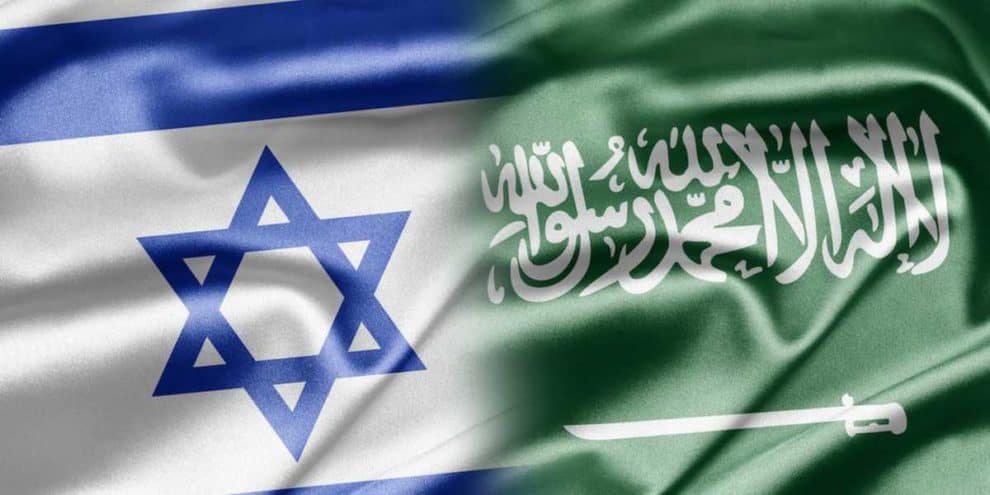The outbreak of war between Israel and Hamas risks hardening anti-Israel sentiment in Saudi Arabia, which Washington has spent months trying to coax into a landmark normalisation deal.
Saturday’s surprise attack by Hamas militants and the Israeli military’s response disrupted speculation about a possible breakthrough that could reorder the Middle East, with Crown Prince Mohammed bin Salman telling Fox News last month that “every day we get closer”.
Public visits by two Israeli government ministers to the Saudi capital generated even more buzz, even as some ordinary Saudis made clear their staunch disapproval of warming ties.
Days before fighting began, Mohammed Bandar, a 20-year-old university student, told AFP he opposed normalisation because of Israel’s “occupation” of the Palestinian Territories.
“To take their money and lands and take the greatest symbol of Islam, which is Al-Aqsa mosque (in Jerusalem), I see this as an occupation,” he said.
With Israel now unleashing thousands of air strikes and vowing a “total siege” of the Gaza Strip, such views are only going to intensify, said Mohammed, a retired engineer in his fifties who agreed to be identified only by his first name because of the sensitivity of the topic.
“Normalisation is now in the drawer,” he said while sipping coffee at a cafe in south Riyadh.
“I cannot imagine Saudi Arabia announcing normalisation with Israel while there is continuous bombing of the Palestinians. Impossible.”
‘On hold’
Saudi Arabia, home to Islam’s holiest sites, has never recognised Israel and did not join the 2020 Abraham Accords that saw its Gulf neighbours Bahrain and the United Arab Emirates as well as Morocco establish formal ties with Israel.
Saudi officials have long insisted their country would not take a similar step without a just resolution of the Israeli-Palestinian conflict.
Under Prince Mohammed, son of the ageing King Salman, Riyadh has laid out conditions for normalisation including security guarantees from Washington and help developing a civilian nuclear programme.
But the 38-year-old de facto ruler also told Fox News that “we need to ease the life of the Palestinians”.
The kingdom’s first statement after Hamas staged its attack on Saturday stressed “the continued occupation and deprivation of the Palestinian people’s legitimate rights”.
And in a phone call with Palestinian president Mahmud Abbas this week, Prince Mohammed said Saudi Arabia continued “to stand by the Palestinian people”.
That does not mean normalisation will be altogether abandoned, but Ali Shihabi, a Saudi analyst close to the government, said: “I think everything will be on hold until we see what happens.”
As for public opinion, it can be difficult to gauge in an absolute monarchy that places strict limits on political speech.
A rare poll commissioned by the Washington Institute for Near East Policy and published in May showed only 20 percent of respondents thought the Abraham Accords would benefit the region.
Flashes of open debate occurred at a recent book fair in Riyadh, where organisers turned heads with their decision to display a 500-year-old Torah scroll on loan from King Fahd National Library.
Among a small crowd who gathered at the display one evening was 21-year-old university student Faisal bin Mohammed, who unlike most people nearby seemed open to considering what Saudi Arabia stood to gain from relations with Israel, notably a security pact with the United States.
“Anything that puts my country first and helps it develop, and makes it a leader among the countries of the world, I welcome it and accept it for sure,” he said.
‘Core issue’
But it is unclear whether such views will hold up amid around-the-clock news coverage of the air strikes now raining down on Gaza.
“The more blood Israel sheds in Gaza, the more difficult it will become to announce a peace agreement,” said 30-year-old Fahd, a salesman who agreed to be identified by only his first name for fear or angering the government, as he sat glued to news broadcasts in a Riyadh cafe.
Hesham Alghannam, a Saudi political scientist and international relations expert, said the war was reaffirming the centrality of the Palestinian issue to how Saudis view Israel, regardless of what happens on the diplomatic front.
“The Palestinian-Israeli conflict has been always the core issue between the Arabs and Israelis, and as long as this conflict is not solved, peace and stability in the region will be difficult to achieve and maintain,” he said.
“The kingdom can only hope that Israel will realise this, and its position remains the same as it was before these events: Progress on resolving the conflict is a precondition for normalisation.”
